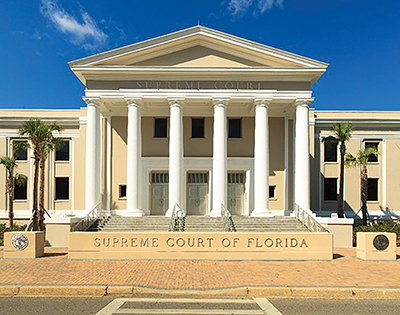
By Jim Saunders, NSF
A divided Florida Supreme Court on Thursday upheld a judge’s decision to impose a maximum prison sentence in a firearm case after the defendant maintained his innocence and refused to show remorse.
Justices, in a 5-2 decision, said Leon County Circuit Judge Robert Wheeler’s decision to impose a 15-year prison sentence did not violate the constitutional due-process rights of Alvin Davis, who was arrested by Tallahassee police in 2016 after a gun was found in a car in which he was a passenger.
A jury convicted Davis of possession of a firearm by a convicted felon, but during a sentencing hearing he spoke to the judge and maintained his innocence. Wheeler cited Davis’ failure to take “responsibility” for the crime and imposed a 15-year sentence that was the maximum allowed under state law.
The 1st District Court of Appeal backed Wheeler, prompting an appeal by Davis to the Supreme Court. In a 21-page majority opinion Thursday, Chief Justice Charles Canady rejected arguments that Davis’ rights had been violated, pointing in part to the judge’s discretion in sentencing and issues such as Davis’ criminal record.
“The trial judge had numerous valid reasons for imposing the maximum sentence here, but … he did not need to articulate any reason,” Canady wrote. “The judge was statutorily authorized to impose a sentence up to 15 years based solely on the fact of the conviction, regardless of any sentencing considerations and whether or not Davis took responsibility for his actions. … Whether a defendant says nothing at sentencing or takes full responsibility and can show that he is a pillar of the community, a judge retains the discretion to impose the maximum sentence.”
But Justice Ricky Polston, in a dissent joined by Justice Jorge Labarga, wrote that the majority opinion was inconsistent with legal precedent and “has no basis in our statutory sentencing scheme.”
“Showing remorse is admitting you did something wrong —- an admission of guilt,” Polston wrote. “And increasing a defendant’s sentence based on the failure to show remorse is punishing a defendant for failing to admit guilt. Punishing someone unless they confess guilt of a crime is a violation of due process and the right against self-incrimination. Accordingly, I would hold that a trial court violates a defendant’s constitutional right to due process and right against self-incrimination where it penalizes a defendant for the failure to admit guilt.”
Under state guidelines, Davis could have faced a sentence of about 10 years in prison to the maximum of 15 years.
Canady was joined in Thursday’s majority opinion by Justices Alan Lawson, Carlos Muniz, John Couriel and Jamie Grosshans. The majority opinion and a concurring opinion by Grosshans said Davis’ comments to the judge maintaining innocence during the sentencing hearing were a key issue.
Grosshans wrote that Davis “spoke voluntarily at sentencing, thereby waiving his constitutional right against compelled self-incrimination.”
“And Davis’s uncoerced words were relevant to the severity of his criminal punishment,” Grosshans wrote. “Specifically, through his words, Davis manifested a refusal to take responsibility for his criminal conduct, a matter bearing on his amenability to rehabilitation. Thus, the sentencing court properly considered Davis’s refusal to accept responsibility for his criminal conduct in imposing the maximum sentence.”
But Polston wrote that “simply because Davis chose to speak and maintain his innocence does not mean he should be punished for the failure to admit guilt.”
“Accepting responsibility is an admission of guilt and punishing someone for the failure to admit guilt is a violation of due process and the right against self-incrimination,” the dissent said.
Polston also pushed back against the majority’s argument that the judge could have imposed the maximum sentence without needing to “articulate” the reasons.
“A plain reading of the sentencing transcript shows that the trial judge relied on Davis’ claim of innocence,” Polston wrote. “In his allocution, Davis maintained that he was innocent and that his conviction was based on conspiratorial actions by the police and deficient legal representation. The trial judge then admonished Davis for failing to take responsibility and sentenced him to the statutory maximum because he had failed to take responsibility.”
Davis, 42, is an inmate at Charlotte Correctional Institution, according to the Florida Department of Corrections website.


Be the first to comment